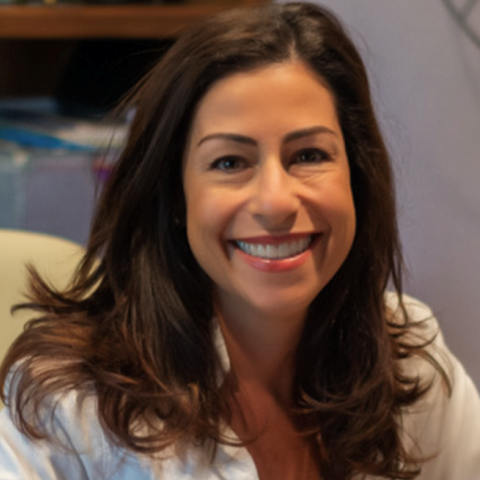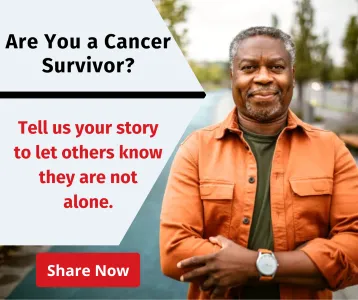Giving Back & Moving Forward: Meet Cancer Survivor Marcia Donziger

Editor's Note: This is part of our Survivorship series. Please see other posts in this series.
Marcia Donziger's personal experience with stage 3 ovarian cancer inspired her to create the nonprofit MyLifeLine.org in 2007. MyLifeLine is an online support community where people impacted by cancer can easily connect to their community to reduce stress, anxiety, and isolation. In 2018, MyLifeLine merged with CSC.
In this Q&A, we learn more about Marcia’s personal cancer journey and what cancer survivorship means to her.
Tell us a bit about your yourself.
I am a stage 3C ovarian cancer survivor diagnosed at age 27. When I lost my fertility, I never lost my dream of becoming a mom. With the help of an incredible surrogate mom and egg donor, I am lucky to have twin sons who are now 15 years old. We survived high school freshman year during a pandemic and are gently going out into the streets with new driver’s permits in hand. Our family lives in Denver, Colorado, and loves to get out into the mountains for skiing and hiking.
My passion is to support people in reaching their greatest potential.
"Don't do cancer alone. Advocating for others — and just being there as a friend who listens — are my ways of coping and moving forward."
What does cancer survivorship mean to you?
For me, survivorship means giving back if you are lucky enough to live through it. If you are struggling during treatments and with long-term effects, survivorship means leaning on your community. Don’t do cancer alone. Advocating for others — and just being there as a friend who listens — are my ways of coping and moving forward. That’s why I started the nonprofit organization MyLifeLine Cancer Foundation in 2007: to transform the cancer experience through community and connection. We are all wired for connection and belonging.

How has your cancer experience taught you to face your fears and learn from them?
My cancer experience taught me that I can weather storms. From the moment I was diagnosed with cancer, I was simultaneously diagnosed with infertility. There was no warning, preparation, or advance notice. At the time, I was newly married and ready to start a family. When uncontrollable forces of life crash in, the only control we have is how we respond. A year to the date of my diagnosis, I was standing in a divorce court alone because my marriage did not weather the storm. It was a tumultuous triple-threat year — cancer, infertility, and divorce. The fact that I made it through and rebuilt my life means I can face adversity again, and I will be okay.
You have done some amazing activities to help raise funds for cancer causes. For example, you once rappelled down a 30-story building. What was one of the most memorable things you’ve done?
We can’t serve people unless we raise money to generate resources, tools, programs, and services. I did rappel down a 30-story building, which was terrifying! Much harder than that was when I rode my bike for 200 miles over 3 days from Philadelphia to Washington, D.C. I had never owned a road bike before, so I bought one and intensely trained for 5 months leading up to the race. It was incredibly memorable because of the hard work invested to get there.
"I have discovered it’s most important to meet people where they are and to listen, empathize, and offer help."
When you created MyLifeLine, what did you envision for it?
I envisioned every cancer patient being able to access the community and cancer-specific resources necessary to reduce stress, anxiety, and isolation. MyLifeLine was designed as a digital tool that I would have benefited from during my own treatment process. I often felt overwhelmed during my cancer journey. In addition to the medical challenges, I could not manage the incoming messages of love and support effectively. I dreaded calling people back as I could not repeat the same depressing information.
MyLifeLine is a streamlined way to communicate your health updates, find educational resources, reach a counselor through the Cancer Support Helpline, and find a local support center. MyLifeLine gives patients a way to easily connect with loved ones for social, emotional, and practical support. MyLifeLine is also a therapeutic outlet for patients and caregivers to share and process their own unique health journeys. Essentially, MyLifeLine is a digital 24/7 hub for your personal cancer community.
What is one of the greatest gifts you’ve discovered on your survivorship journey?
Without cancer, I would not have found my passion in life. The friends and colleagues I’ve met, the cancer warriors and their families — it’s a privilege to support others from a place of knowing what it’s like to have heard the 3 words “You have cancer.” I have discovered it’s most important to meet people where they are and to listen, empathize, and offer help.
What is one piece of advice you’d like to share with other survivors — something you wish someone would have told you when your cancer journey began?
Every journey is unique. Find your oncology social worker to walk alongside you. The relationship with my social worker at the hospital was a critical part of my healing process. We don’t know what we don’t know, but the social worker often does. Your medical team can direct you. If there is no one at your cancer center, call CSC’s Helpline. We are here to navigate you to valuable resources. Don’t suffer in silence. We are here for you.